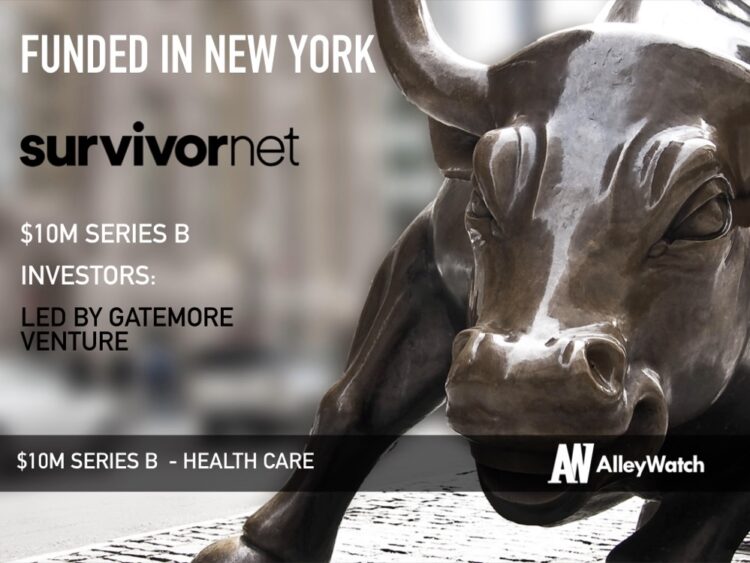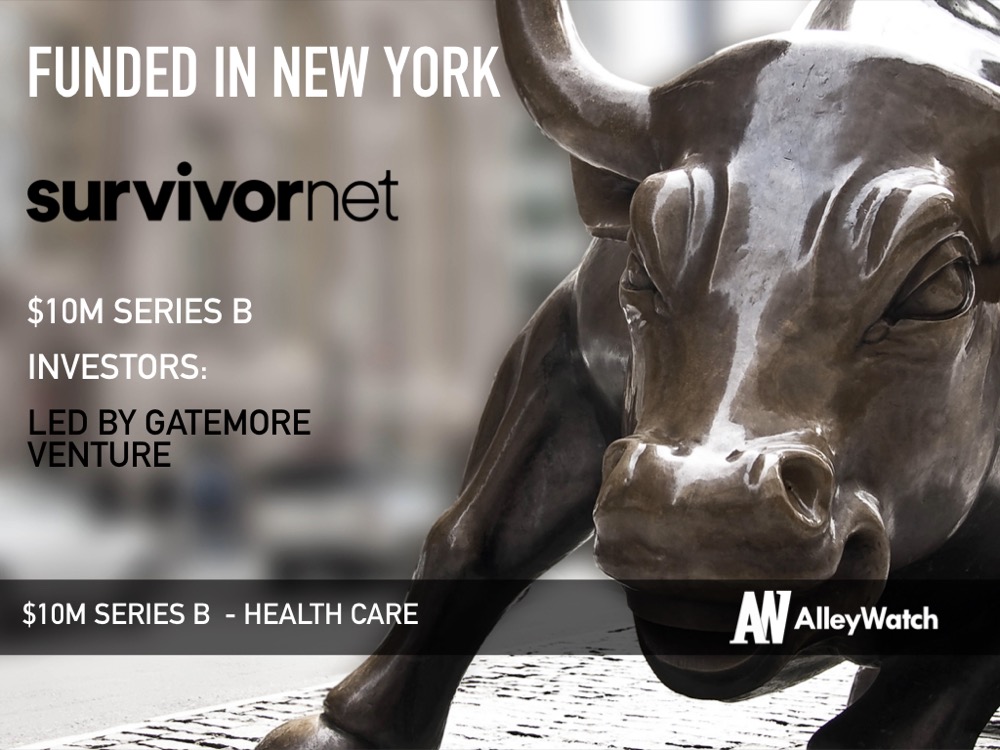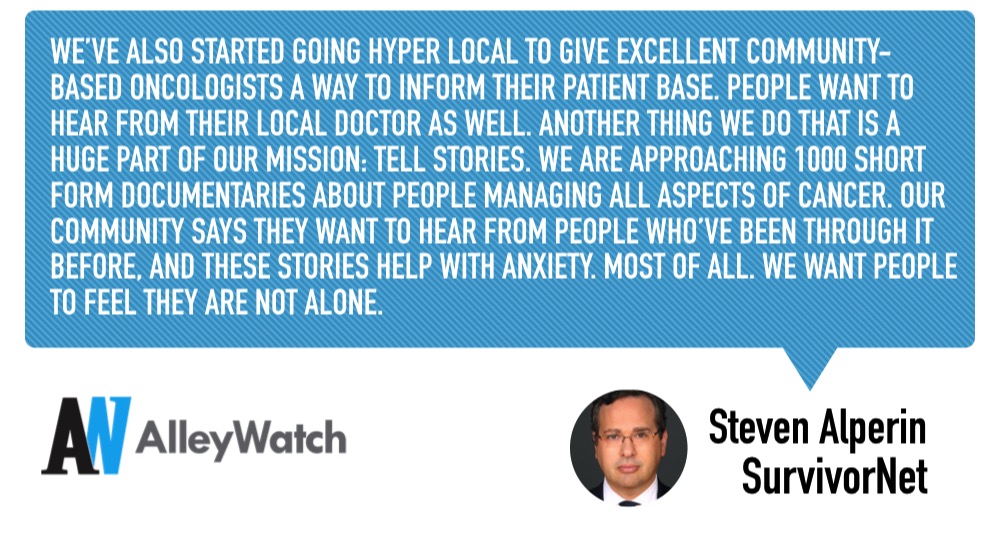A life-threatening illness like cancer demands that you have access to the best and most accurate information; unfortunately, this isn’t always the case. SurvivorNet is the knowledge platform that helps millions of people get information from cancer experts. SurvivorNet has allocated various cancer treatment options and perspectives in a singular place. It also goes a step further by utilizing video-formats to explain definitions and treatments that government or media outlets fail to explain in colloquial, comprehensible terms. SurvivorNet is more than just a knowledge database, it has created a community of cancer patients and survivors through 1000 short documentaries sharing the stories of people dealing with all aspects of cancer.
AlleyWatch sat down with CEO and Cofounder Steven Alperin to learn how the company’s recent funding round will make a critical impact on SurvivorNet’s ability to expand and offer more services.
Who were your investors and how much did you raise?
We raised $10M in a Series B led by Gatemore Ventures, a subsidiary of Gatemore Capital Management, a London-based asset manager.
 Tell us about the product or service that SurvivorNet offers.
Tell us about the product or service that SurvivorNet offers.
SurvivorNet is now the country’s leading media platform solely dedicated to cancer information. 80% of people with a cancer diagnosis never make it to a designated comprehensive cancer center, and the data is clear that these people tend to have worse outcomes with their disease. SurvivorNet is helping millions of people get information from these experts who they ultimately might not be able to access. We are the only platform that has taken the time and allocated the necessary resources to collaborate with high volume cancer centers in order to bring a variety of treatment options in one easily accessible information source.
Across cancer, there are significant differences in treatment options for the same conditions ranging from breast cancer to ovarian cancer to multiple myeloma. For example, in very early-stage breast cancer, should a woman follow an aggressive form of treatment or undergo a period of surveillance? In prostate cancer, should a man have surgery, radiation, or undergo “watchful waiting”? In diseases such as multiple myeloma and other blood cancers, where there has been an explosion of therapies, there are significant differences in recommended treatments depending on a patient’s condition or where they seek care. What SurvivorNet has done is bring together the various treatment options and perspectives to one place.
What inspired the start of SurvivorNet?
Connecting over the cancer diagnosis of our respective parents, my cofounder Tim Langloss and I noticed the massive need for accurate, timely, and accessible information around the topic of cancer. I don’t care how much money you have, when a cancer diagnosis happens, it’s far too difficult to get the right information. My family was part of the group that didn’t quite get the right answers. These experiences inspired us to create a platform where patients and families can access all the information they need from reputable sources.
How is SurvivorNet different?
SurvivorNet is the only platform that brings together the varying viewpoints of the top cancer doctors in the country. If you access some of the informational products put out by the government or various health media outlets, you’ll find very definitional write-ups and very dry information with no nuance. No one is providing the differing viewpoints on treatment and no one is sharing the information in a video format.
We’ve also started going hyper-local to give excellent community-based oncologists a way to inform their patient base. It takes a ton of work and commitment, and it’s having an impact in the cities we have piloted. People want to hear from their local doctor as well.
Another thing we do that is a huge part of our mission: tell stories. We are approaching 1000 short-form documentaries about people managing all aspects of cancer. Our community says they want to hear from people who’ve been through it before, and these stories help with anxiety. Most of all. we want people to feel they are not alone.
What market does SurvivorNet target and how big is it?
SuvivorNet is focused heavily on the 1.8M Americans diagnosed with cancer per year, the 18M Americans who are currently alive after receiving a cancer diagnosis (cancer survivors). We estimate 200M people in the country are interested and need quality information about preventative care such as genetic screening and testing for early detection of cancer such as mammograms and colonoscopies.
There is also a $150M global market for oncology drugs and a similarly enormous number spent in the U.S. alone on cancer care that cannot be ignored.
What’s your business model?
Our current business model is focused on highly targeted advertising collaborations. We want people to go into the doctor and ask the “what about this question?”
Second, because we have developed tremendous expertise in explaining complicated info to patients, our studios division is thought out by clients across healthcare to create content products that help them effectively communicate with patients whether it’s about a confusing topic such as clinical trials or a new treatment.
We consider our main competitors to be the established health websites, which are largely 25 years-old and deeply flawed products. Would you send your loved one to WebMD to get important cancer information? We also consider “Dr. Google” to be a main competitor. Search is filled with incomplete, and sometimes, inaccurate information.
Would you send your loved one to WebMD to get important cancer information? We also consider “Dr. Google” to be a main competitor. Search is filled with incomplete, and sometimes, inaccurate information.
What was the funding process like?
Our most important consideration in the funding process is that our investors share our values. We exist to help people make better decisions about their health and we approach it with a rigorous, independent approach to patient-focused journalism.
What are the biggest challenges that you faced while raising capital?
We are both a digital health company and a content company. We are also very much an impact company. So sometimes people want to label you.
What factors about your business led your investors to write the check?
The information we are providing and the resources we are creating every day are helping people make better decisions about their health. This is an enormously important social problem and has a high value for companies looking to provide solutions for cancer patients. Our capital partners see the potential to scale how we help millions of people and how we effectively collaborate with patients, research institutions, advocates, and industry.
What are the milestones you plan to achieve in the next six months?
In the next six months, we are expanding the number of specific cancers we cover. Each of these will have hundreds of pieces of video accompanied with peer-reviewed content, in which leading doctors participate in the process of developing and validating content.
To date we have produced nearly one-thousand short documentaries, so we will be launching a linear version of SurvivorNet called SurvivorNet TV.
We also have several strategic initiatives that build on our success reaching highly targeted patients in local markets.
In the next six months, we are expanding the number of specific cancers we cover. Each of these will have hundreds of pieces of video accompanied with peer-reviewed content, in which leading doctors participate in the process of developing and validating content.
To date we have produced nearly one-thousand short documentaries, so we will be launching a linear version of SurvivorNet called SurvivorNet TV.
What advice can you offer companies in New York that do not have a fresh injection of capital in the bank?
Never stop.
Where do you see the company going now over the near term?
We see our company reaching millions more people who need help and building our team to help more effectively serve this incredibly important community.
What’s your favorite restaurant in the city?
Sweetgreen. That’s not a joke or a bad answer to an interview question. When you work this hard, it’s pretty important to at least attempt the healthy thing.
Nominations are now open for AlleyWatch’s 2020 NYC Tech Influencers feature.
Know someone amazing who belongs on this list? Nominate them today here. Nominations open until 2/4. Looking to drive targeted response from the NYC Tech community at scale, learn more about partnering with AlleyWatch on this initiative here.





